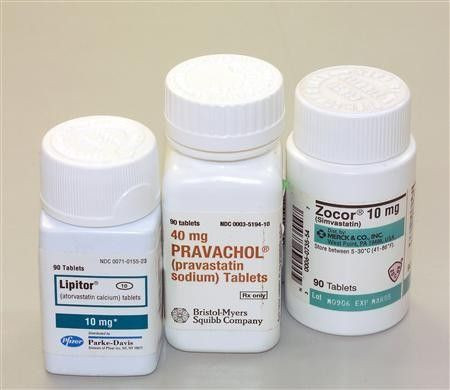Statins Could Aggravate Diabetes Risk in Women: Study

Diabetes could be an added risk for women taking the cholesterol-lowering drug, more popularly touted as statins.
The research, published in the Jan. 9 issue of the Archives of Internal Medicine, states that postmenopausal women on statins have a higher risk of developing diabetes. In fact, it could increase the chances of developing Type 2 diabetes in women over the age of 45.
As of now, one in four Americans over 45, with cardiovascular disorders, is prescribed statins for cholesterol management. The new findings state that patients on statins have a 48 percent increased rate of diabetes, compared to those not on the cholesterol-lowering medication.
The study also observes the new findings could have a significant impact on current clinical practice in cholesterol management in patients with heart ailments.
Lead author, Yunsheng Ma, MD, PhD, Associate Professor of Medicine and an epidemiologist at University of Massachusetts' Medical School in Worcester (UMMS), noted that with the high prescription of statin drugs for cholesterol management it is important for future studies to evaluate the risks as well as benefits of statin use among men, women and diverse ethnicities with different risk profiles.
Statin medication use in postmenopausal women is associated with an increased risk for diabetes mellitus (DM), wrote Yunsheng Ma and his colleagues.
The study's conclusion states statin medication use in postmenopausal women is associated with an increased risk for DM. This may be a medication class effect. Further study by statin type and dose may reveal varying risk levels for new-onset DM in this population.
The UMMS study focused on 153,840 women who did not have diabetes at enrollment. After adjusting for confounding factors, statin use at baseline was associated with a 48 percent increased risk of diabetes. The association was observed for all types of statin medications.
This study investigated whether the incidence of new-onset diabetes mellitus (DM) was associated with statin use among postmenopausal women participating in the Women's Health Initiative (WHI).
Statin should not be seen as the magic pill, said Ma.
Statins have categorically become one of the most regularly administered drugs for managing cholesterol in heart diseases. Statins benefit by lowering the so-called bad LDL cholesterol. Previous studies have stated these are life-savers in patients with severe heart disorders.
As with most drugs, there is a side effect attached to the benefits and the new study has evoked a debate on yet another side effect of statins.
Statins are known to cause muscle pain on rare occasions that could trigger muscle breakdown, leading to kidney failure and even death.
The questions being asked concern the quantity of the drug effective for those not suffering from non-cardiovascular disorders.
The UMMS researchers examined data from the Women's Health Initiative, the wide-ranging national health study funded by the National Institutes of Health (NIH) in which 161,808 postmenopausal women aged 50 to 79 were followed for 15 years.
As part of that larger trial, some of the women were prescribed diet changes or took daily hormone therapy or vitamins, while others were not told to change their diet or lifestyle.
The Women's Health Initiative has provided data and analyses that has led to challenging several areas of common medical practice, such as the overuse of hormone therapy for women who were post-menopause, said co-author Judith K. Ockene of the Barbara Helen Smith Chair in Preventive & Behavioral Medicine and a Professor of Medicine and a principal investigator of the Women's Health Initiative. UMMS was one of 40 clinical centers for the Women's Health Initiative.
According to surveys by the National Center for Health Statistics, the rate of Americans over age 45 taking statins has increased tenfold over the last 20 years, from two percent in the period from 1988 to 1994, compared to 25 percent from 2005 to 2008, the most recent years for which figures are available. The federal data also shows that figure jumps to 50 percent of men ages 65 to 74 taking statins, while 39 percent of women age 75 and older are doing so.
© Copyright IBTimes 2024. All rights reserved.





















